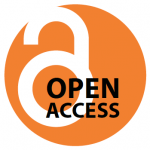
During the month of Open Access week (October 19-25) we will be highlighting a number of guest posts from University of Iowa Faculty and Staff who have personal experience with Open Access. We appreciate their contributions.
The sixth guest post is by Kembrew McLeod, Professor of Communication Studies at the University of Iowa and an independent documentary producer. A prolific author and filmmaker, he has written and produced several books and documentaries that focus on popular music, independent media and copyright law.
See all of Kembrew’s Iowa Research Online deposited publications here.
Q: Two of the publications you have deposited in the IRO received an extraordinary number of downloads in the first half of this year, “Freedom of Expression: Overzealous Copyright Bozos and Other Enemies of Creativity” (had 1772 from Jan-July 2015), and “Genres, Subgenres, Sub-Subgenres and More: Musical and Social Differentiation Within Electronic/Dance Music Communities“(had 1347 from Jan-July 2015). Could you tell us a little about these two publications?
Freedom of Expression was my second book, which originally was published by Doubleday-a trade press that miraculously allowed me to license it under a Creative Commons license. These licenses make it easy for authors to legally encourage the sharing of their work, and it has been an enormously successful project (since 2004, millions of books, songs, etc. have been published under Creative Commons licenses). “Genres, Subgeners, Sub-Subgenres and more” is an article I wrote when I was a grad student, which happens to be one of my most cited publications.
Q: Were there specific reasons behind putting these two publications in the IRO?
Quite simply, I wanted to make it easy to share my work, and by putting it in the hands of librarians, I knew that it would be properly archived and made accessible to the public
Q: Have you seen any benefits from having these works available freely and openly through the IRO?
Yes, definitely. By making it accessible, it increases the chances that other scholars (and, more generally, the public) might be exposed to my writing. This has certainly increased the number of other scholarly publications that have cited my work, which is obviously a good thing.
Q: What are your general thoughts on the value and importance of academics making their work open access?
Open Access is hugely important. In fact, I no longer publish in journals that have overly restrictive copyright policies. The final straw was when I was prevented from sharing one of my own articles because Digital Rights Management (DRM) crippled the PDF file. DRM is a technological protection system that limits the number of times-or the ways in which-a work may be copied and distributed. After I emailed the PDF of my article to my undergrad class, a student tried to print out a copy of my article. Unfortunately, all that was printed out was a blank sheet of paper, save for a notice at the bottom that read: “Reproduced with permission of the copyright owner. Further reproduction prohibited without permission.”
I had no idea Blackwell, the company that published it, set limits on the distribution of my own article, though I’m not at all surprised. I can’t think of a more disturbing, yet poetic, expression of copyright-gone-mad than a blank sheet of paper where published research should be. The most insane thing is that I got the PDF from a database that the University of Iowa subscribes to-which means that the state paid me a salary to produce knowledge, and then my library had to pay a private company to access that knowledge, and on top of all that I was still prevented from distributing my own writing!